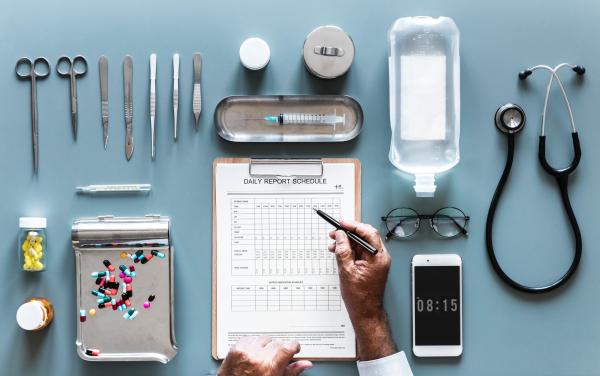
Persistent inflammation in your sinuses and nose membranes can cause fleshy growths known otherwise as polyps. It’s not that every chronic sinusitis leads to polyps, but when polyps form, they result in a sinus and nasal passage blockage. This does not only diminish your sense of smell, but can also make breathing difficult. Polyps also create a favorable environment for the growth of sinus infection. Inhaling steam, drinking water, sleeping with an elevated head and taking long showers, are just some ways of dealing with sinusitis. Antibiotics may also be prescribed to treat bacterial sinus infections . But if your symptoms have become chronic and your sinuses are inflamed, then corticosteroids may be required to treat your specific condition.
One such corticosteroid is Prednisone, which is found to be effective in treating sinus infection. Here at oneHOWTO, let’s find out how much Prednisone to use for sinus infection.
What is Prednisone?
Prednisone is known otherwise as a type of steroids and/or corticosteroids. Remember, corticosteroids are not like the anabolic steroids that athletes often abuse. Prednisone is used for the treatment of a number of health problems, including: blood disorders, infections, allergies, skin disorders and certain types of cancer. It is also prescribed to prevent the rejection of a transplanted organ by the body. This drug works by reducing inflammation. and aiding in the treatment of autoimmune diseases. Prednisone is available in both oral tablet and syrup form. It is also administered through injection, however this is only recommended under medical supervision.
A short Prednisone course may be prescribed to help you feel better. Prednisone is effective in:
- Reducing swelling
- Blocking allergies
- Alleviating nausea and pain
- Boosting energy levels
- Alleviating asthma
- Shrinking nasal polyps
- Restoring hearing ability in patients who encountered sudden deafness
However, Prednisone should be used carefully because it can lead to addiction and to severe other side effects, especially if taken long term. For this reason, Prednisone should only be reserved for the most urgent cases, if all other local and topical steroids fail to work. Read How Long Does it Take for Prednisone to Work.

How to use Prednisone
If you have been prescribed oral Prednisone, you should take it with milk or food to prevent bloating or stomach upset. Take oral Prednisone with a glass of water, unless your doctor says otherwise. If you are taking Prednisone syrup, you should use a special measuring spoon to carefully measure its dose. Using a kitchen spoon may not measure the correct amount. If you need to take only one dose a day, we recommend taking it in the morning, since it may disturb sleep.
Take your Prednisone dosage exactly as instructed by your physician. Follow the schedule and dosage amount carefully. The dosage of the medicine and the length of your treatment largely depends on your: individual medical condition, the severity of your disease and your response to the treatment.
You should never stop taking Prednisone unless your doctor advises you to do so. If you suddenly stop taking this medicine without medical advice, in some cases, your conditions may worsen. You may also start experiencing symptoms such as: weakness, nausea, weight loss, headaches, dizziness, tiredness, muscle pain etc. In order to prevent such symptoms, your doctor will advise you to reduce the dosage slowly. If you develop any new symptoms during this time, you should let your doctor know immediately.
Recommended Dosage of Prednisone
Your doctor will likely recommend that you inhale the steroid through the nose. Inhaling steroids delivers the steroids directly to the inflamed parts of your tissues. But if you have polyps in your nose, they may block your nasal passages and stop the steroid from reaching the inflamed areas. If inhaled steroids prove not to be effective in giving you desired results, a your doctor may consider giving you a short course of oral Prednisone. Taking Prednisone for about a week is enough to reduce the size of polyps and reduce overall nose inflammation. Since inflammation is reduced and polyps shrink in size, inhaled steroids can reach their target easily and deliver the best results. Patients are most commonly prescribed 60mg of Prednisone per day, but the dosage may vary, depending on the condition of the patient and their individual response to the drug.
Most doctors avoid using oral steroids, this is likely because these steroids travel into the patient’s blood stream and in turn one's entire body becomes exposed to the medicine. On the contrary, topical and inhaled steroids are only exposed to the sinuses and nose. Patients taking oral steroids are more susceptible to developing side effects. These side effects may include mood swings, increased blood pressure and glaucoma. However, no serious side effects should occur as long as Prednisone is taken in low dosage for a short period of time, supervised by a medical professional.

Missed or Overdose of Prednisone
If someone experiences a Prednisone overdose and starts experiencing severe symptoms from the drug, such as trouble breathing or passing out, then you should call your doctor immediately and seek emergency help. This medicine can result in serious consequences and should not be shared with others, even if they show similar symptoms to you.
If you have been prescribed this medication for an extended period of time, then your doctor will recommend getting medical tests on a regular basis, including: blood mineral levels, a complete blood count, a bone density test, eye examination, blood pressure readings, weight/height measurements, blood glucose levels etc. These tests will monitor your: response to the drug, keep track of your progress and check for any side effects.
If taken for a long period of time, Prednisone may result in bone problems, especially osteoporosis. Therefore, you will need to make some lifestyle changes while taking this medicine. You will have to: stop smoking, limit alcohol intake, do some weight bearing exercises, and make sure you are receiving enough of vitamin D and calcium. Depending on your condition, your doctor will advise you about some more specific lifestyle changes.
In case you miss your Prednisone dose, you should take it as soon as you remember. If it is almost time for your next dose, you should skip the missed dosage and resume your usual scheduled dose. Never take double dosages in order to compensate.
Precautions to Take While Using Prednisone
Since Prednisone may cause some severe side effects, you should always inform your doctor if you are allergic any of the active or inactive ingredients in it.
Before taking Prednisone, you should also inform your doctor beforehand if you have:
- Any heart problems
- High blood pressure
- Kidney disease
- Thyroid problems
- Liver disease
- Stomach ulcers
- Intestinal problems
- Osteoporosis
- Mental or mood disorders
- Eye disease
- Diabetes
- Blood clotting problems
- Seizures
- Bleeding problems
- Mineral imbalance
Using Prednisone for a long time may make cause difficulty in your body responding to physical trauma. Therefore, inform your doctor beforehand, if you are going for an emergency treatment or surgery, even if you have used the medicine for over the previous 12 months.
In addition, immediately inform your doctor if you start suddenly losing weight or if you experience extreme tiredness for no reason. While taking this medication, wear a medical ID bracelet or carry a warning card that indicates that you are taking this medicine.
This article is merely informative, oneHOWTO does not have the authority to prescribe any medical treatments or create a diagnosis. We invite you to visit your doctor if you have any type of condition or pain.
If you want to read similar articles to How Much Prednisone to Use For Sinus Infection, we recommend you visit our Drugs & supplements category.